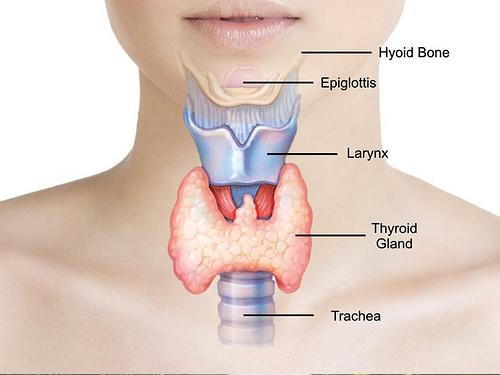- posted: Jan. 17, 2017
What are common thyroid disorders?
Hypothyroidism is the most common thyroid disorder. This can be defined as the underproduction of thyroid hormones. Hashimoto's disease, an autoimmune disorder in which the body attacks the tissue of the thyroid, is a common form of hypothyroidism. There are several other rare causes of hypothyroidism, one of them being a completely "normal" thyroid gland that is not making enough hormone because of a problem in the pituitary gland. If the pituitary does not produce enough thyroid stimulating hormone (TSH) then the thyroid simply does not have the "signal" to make hormones. Symptoms of hypothyroidism can include fatigue, weight gain, lethargy, mood swings etc.
Hyperthyroidism is defined as the overproduction of thyroid hormone. This can include Graves' disease, an autoimmune disease in which the body's immune system creates an antibody that causes the gland to make an excessive amount of thyroid hormone. Graves' disease runs in families, and usually affects younger women. Symptoms of Graves' disease can include swelling of the tissue around the eyes, bulging of the eyes, anxiety, or tremors. Rarely, patients with Graves’ disease can develop a lumpy reddish thickening of the skin in front of the shins known as pretibial myxedema.
Thyroiditis is an inflammation of the thyroid gland. This is when a virus or problem with the immune system causes the gland to swell or become inflamed.
Thyroid nodules are also a common disorder of the thyroid. These lumps or nodules grow in the thyroid gland and can increase the circulating levels of thyroid hormone in the blood stream.
What does the thyroid do?
Your thyroid helps determine how you metabolize food, how you store and use energy, how you think, talk, sleep etc. If your thyroid isn’t functioning properly, your life can seem significantly off-balance. The thyroid is responsible for metabolism, brain development, blood cell production, muscle and bone strength, body temperature regulation, menstrual cycle regulation, weight gain or loss, cholesterol levels, and skin hydration.
Where is the thyroid?
The thyroid is centrally located at the base of the throat, between the brain and rest of the body. This butterfly-shaped thyroid gland helps maintain overall balance in the body.

What lifestyle factors can inhibit the proper function and production of thyroid hormones?
- Eliminating caffeine and sugar, including refined carbohydrates, can greatly improve the overall function of your thyroid.
- Increasing protein intake can be helpful in thyroid function because protein transports thyroid hormone to all your tissues and enjoying it at each meal can help normalize thyroid function.
- Eat fat! Fat is your friend and cholesterol is the precursor to hormonal pathways. If you’re getting insufficient fat and cholesterol, you could be exacerbating hormonal imbalance, which includes thyroid hormones.
- Omega-3s, found in fish, grassfed animal products, flaxseeds, and walnuts, are the building blocks for hormones that control immune function and cell growth, are critical to thyroid function, and improve the ability to respond to thyroid hormones.
- Address underlying food sensitivities. Just like the body’s attack on the thyroid in the presence of Hashimoto’s, the body will also see offending or inflammatory foods as an invader and kick up the autoimmune response. Systemic-wide inflammation and autoimmunity often go hand-in-hand.
- Do a gut check. Healthy thyroid function depends on a sufficient supply of healthy gut bacteria. Make sure to add a probiotic supplement and eat foods rich in healthy probiotics such as kimchi and sauerkraut.
- There is an intimate connection between your thyroid and adrenal glands and it’s uncommon to have hypothyroidism without some level of adrenal fatigue. If you suspect that you are suffering from adrenal fatigue, you can have your cortisol levels tested. Ask Dr P at your next visit.
- Look at your stressors and practice relaxation. Health cannot be achieved through diet alone. Finding ways to reduce stress in your life can be hugely beneficial in hormone function. The thyroid is a very sensitive gland and is exceptionally reactive to the stress response.
Which nutrients and supplements help encourage healthy hormone production?
- You need an adequate supply of iodine to make thyroid hormone. Food sources include poultry, eggs, kelp, and other seaweeds.
- Glutathione is a powerful antioxidant that strengthens the immune system and is one of the pillars of fighting Hashimoto’s. It can boost your body’s ability to regulate the immune system, dampen autoimmune flare-ups, and protect and heal thyroid tissue. Glutathione is available in supplement form. Eating asparagus, broccoli, avocado, spinach, garlic, and squash can also help the body to produce glutathione.
- Add a B12 supplement. If you are not already taking a B12, ask Dr P to be tested at your next appointment to see which formula your body responds to.
- Selenium supports efficient thyroid synthesis and metabolism. Foods rich in selenium include tuna, shrimp, salmon, sardines, scallops, lamb, chicken, beef, turkey, eggs, and shitake mushrooms.
- Zinc plays a role in the conversion of the thyroid hormone T4 to T3. Food sources of zinc include shellfish, mollusks, meat, legumes, and nuts. It is very common to need an additional zinc supplement.
- Research has shown a strong association with vitamin D deficiency and people with hypothyroidism.
- The microbiome in the gut plays a critical role in many physiological processes, including thyroid function. A probiotic supplement is crucial for many reasons including proper thyroid function.
Locations
6940 South Holly Circle Suite 201
Centennial, CO 80112, US
Office Hours
Our Regular Schedule
8am - 1pm
3pm - 5pm
8am – 1pm
3pm – 7pm
Closed
Closed
8am – 1pm
3pm – 7pm
8am – 2pm
Closed
Closed
Closed
Closed
Closed












